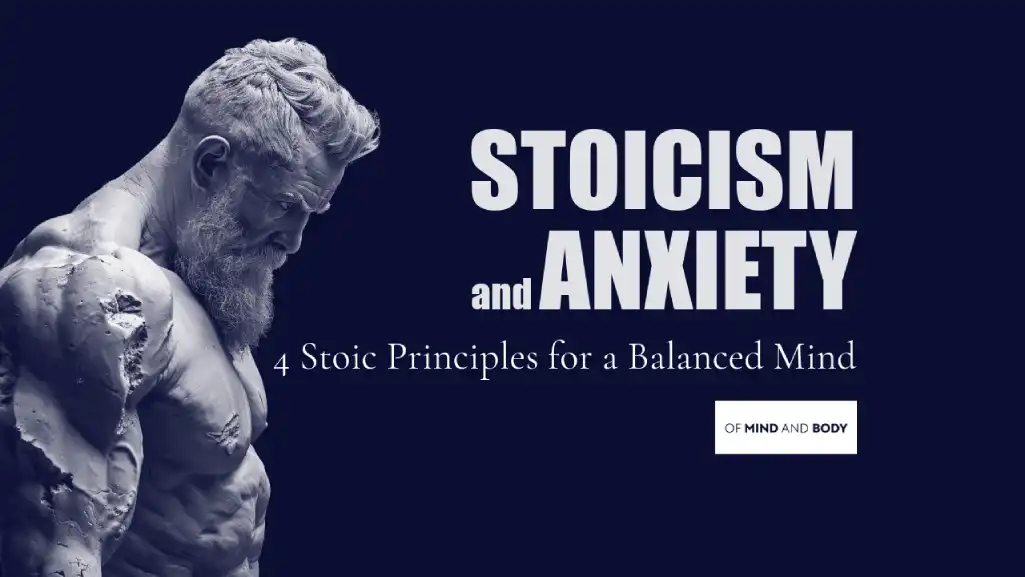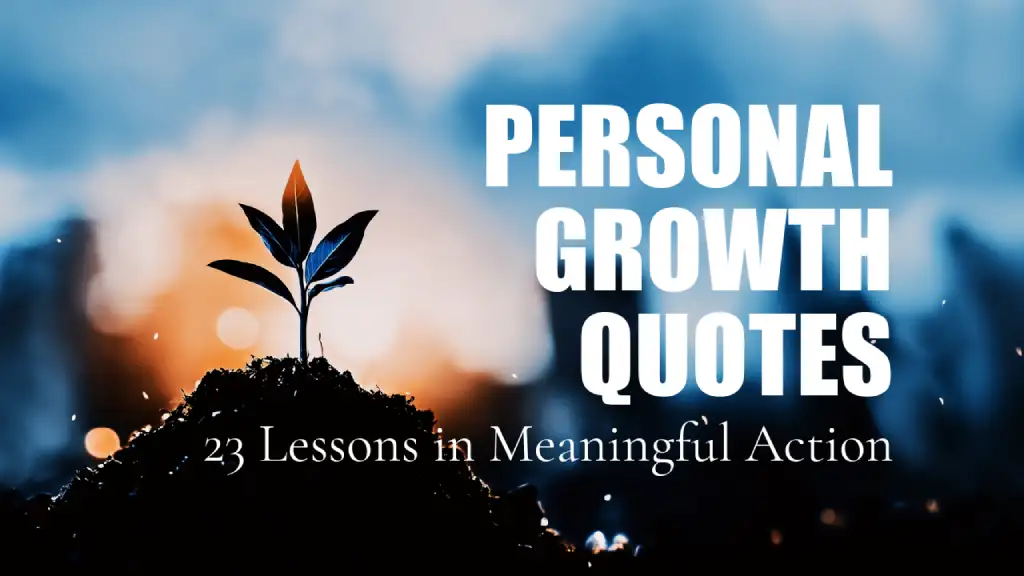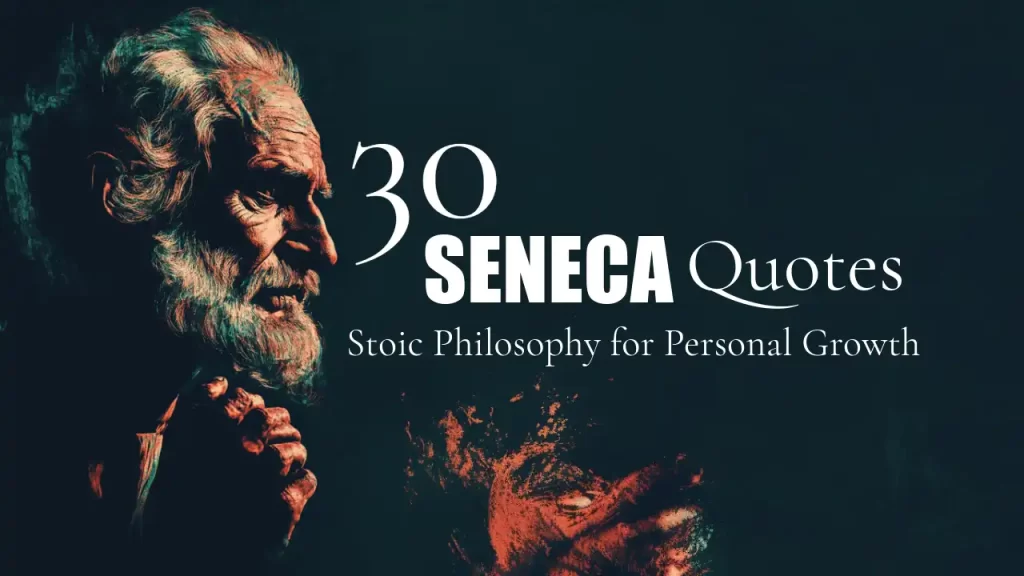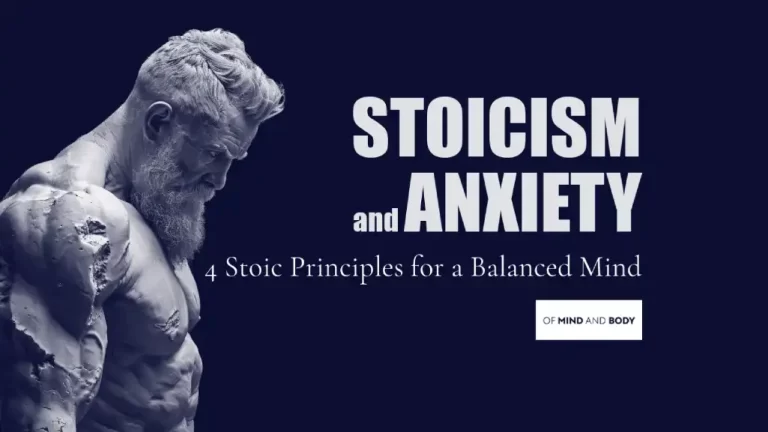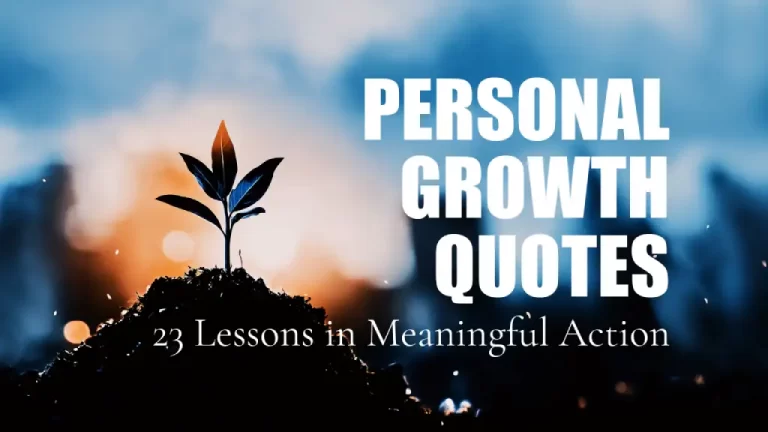
In the article “Stoic Quotes on Self Love,” we embark on a journey through the ancient wisdom of Stoicism, exploring its profound insights into the art of self–love. Stoicism, a philosophy that teaches the development of self-control and fortitude as a means of overcoming destructive emotions, offers timeless guidance on how to cultivate a loving and compassionate relationship with oneself.
Through “Stoic Quotes on Self Love,” we delve into the minds of Stoic philosophers like Marcus Aurelius, Seneca, and Epictetus, uncovering the rich tapestry of thoughts and reflections that encourage us to turn inward and foster a sense of peace, resilience, and self-acceptance. This exploration not only highlights the relevance of Stoic principles and quotes in the modern quest for self–love but also invites us to reevaluate our approach to self-care, emphasising the importance of mental and emotional well-being as the foundation of a harmonious life.
10 Stoic Quotes on Self Love to Foster Compassion, Worth and Appreciation
“Be tolerant with others and strict with yourself.”
Seneca
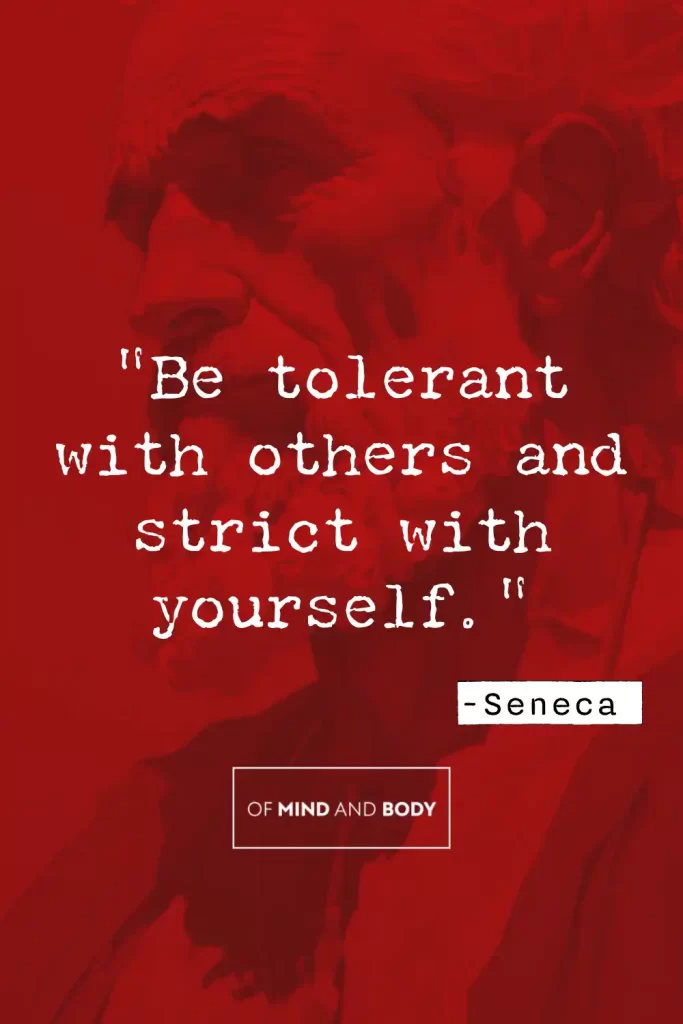
The Wisdom Behind the Words
This timeless piece of wisdom from Seneca encapsulates a profound principle that lies at the heart of Stoicism and offers a compelling perspective on self–love. At its core, the quote urges us to practise patience and understanding towards others while holding ourselves to high standards of personal accountability and growth. This duality is not about casting a harsh judgement upon oneself but rather about fostering a disciplined, compassionate form of self-love that encourages us to be our best selves.
Being “tolerant with others” is a call to extend empathy and understanding towards the people around us, recognising that everyone is on their own journey, fraught with challenges and struggles that we may know nothing about.
This external application of tolerance is, in essence, a reflection of the internal compassion we must nurture within ourselves. It’s a reminder that self-love isn’t just about how we treat ourselves in isolation but also about how our inner peace and self-acceptance enable us to interact with the world in a kinder, more compassionate way.
On the flip side, being “strict with yourself” emphasises the importance of self-discipline, integrity, and the relentless pursuit of personal improvement. It’s about setting high standards for our own behaviour and actions, not as a form of self-punishment, but as a way to honour our potential and our commitment to personal growth.
This aspect of the quote challenges us to look inward, to confront our flaws and limitations not with self-loathing but with the resolve to evolve beyond them. In this light, self–love is seen not as self-indulgence but as the courage to hold oneself accountable, to strive for excellence, and to live in accordance with one’s highest values. Through this balance of external tolerance and internal strictness, we find a path to genuine self-love that empowers us to live more fulfilling, virtuous lives.
“If you really want to escape the things that harass you, what you’re needing is not to be in a different place but to be a different person.”
Seneca

The Wisdom Behind the Words
In the heart of Seneca’s wisdom lies a profound call to introspection and transformation that transcends the mere act of seeking external solutions for internal turmoil. This quote encapsulates the Stoic belief that true peace and freedom come not from changing our surroundings but from changing ourselves.
It’s a powerful reminder that the essence of self–love is not found in the external validation or the pursuit of comfort, but in the courageous journey of self-improvement and personal growth. The things that harass us—be it stress, anxiety, or dissatisfaction—are often reflections of our internal state, and it is only by addressing these inner conflicts that we can hope to find genuine serenity.
Seneca’s insight encourages us to foster resilience, adaptability, and a deep sense of self-awareness. It teaches us that self–love is an active, ongoing process of becoming the best version of ourselves. This path is not without its challenges, but it is in facing these challenges that we grow stronger and more compassionate towards ourselves.
The ultimate escape from what harasses us, then, is not a change of scenery but a change of self—a journey that begins with the understanding that the most profound transformations occur not when we change where we are, but when we change who we are.
“The whole future lies in uncertainty: live immediately.”
Seneca
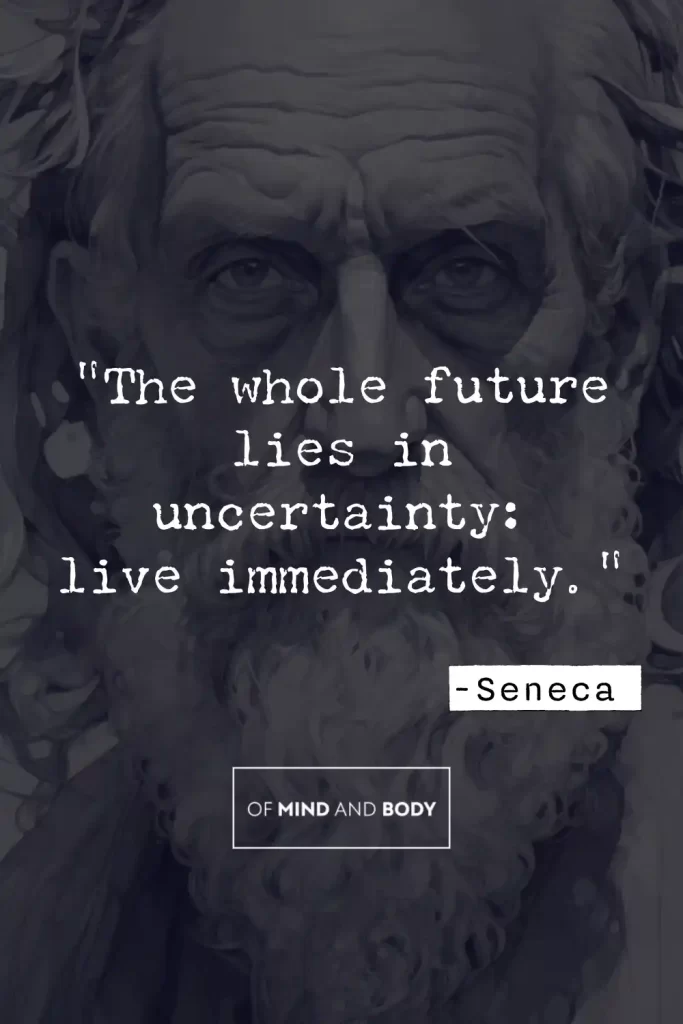
The Wisdom behind the Words
In the midst of life’s unpredictability, Seneca’s words, “The whole future lies in uncertainty: live immediately,” serve as a profound reminder of the intrinsic value of the present moment. This Stoic principle does not merely advocate for a passive acceptance of life’s twists and turns but encourages a deep, active engagement with the here and now.
In the context of self–love, this Stoic quote underscores the importance of valuing oneself enough to prioritise present experiences over the anxieties of future possibilities or the chains of past regrets. It’s about granting oneself the permission to live fully in the present, acknowledging that this moment, in all its fleeting beauty, is both our greatest opportunity and our most precious resource.
Seneca’s wisdom invites us to consider the quality of our internal life as the foundation for external actions. To live immediately is to cultivate an inner sanctuary of peace and acceptance, from which one can act with intention and purpose.
Ultimately, Seneca’s message is a beacon of empowerment. It encourages us to seize control over the one domain where we have absolute power: our mind and our attitude towards the present. In the grand tapestry of life, where the future is a mystery and the past is immutable, the present stands out as a field of possibilities where self-love can flourish.
“To be everywhere is to be nowhere.”
Seneca
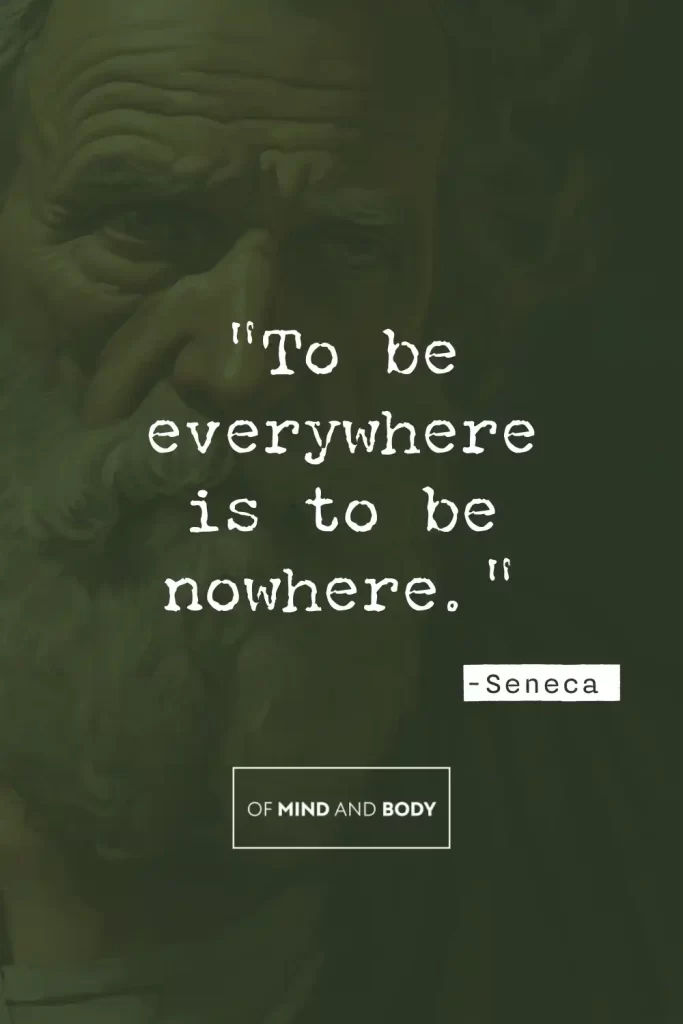
The Wisdom Behind the Words
In the fast-paced world we inhabit, Seneca’s timeless wisdom, “To be everywhere is to be nowhere,” serves as a profound reminder of the importance of presence and focus. This Stoic adage underscores the futility of spreading ourselves too thin, chasing after myriad pursuits in the hope of fulfilment.
In the context of self–love, this Stoic quote invites us to consider the depth and quality of our engagements rather than their quantity. True self-love demands that we give ourselves fully to the moment, to the task at hand, and to our own development. It’s a call to eschew the superficial allure of being omnipresent in favour of cultivating a rich, deeply rooted sense of self that thrives on authenticity and purpose.
The essence of Seneca’s message lies in its encouragement to seek within for contentment and meaning, rather than in the external world’s ceaseless distractions. In practising self–love, this means setting boundaries, prioritising our mental and emotional well-being, and dedicating ourselves to pursuits that genuinely enrich our lives.
This Stoic principle, therefore, is not just a call to action but a call to stillness. It invites us to pause, reflect, and realign with our core values and aspirations. In the journey of self–love, being “nowhere” according to Seneca, means being fully present with ourselves, embracing our imperfections, and committing to our personal growth.
By anchoring ourselves in the present and focusing on what truly matters, we cultivate a form of self–love that is both profound and liberating, guiding us towards a life of fulfilment and peace.
“Freedom is not achieved by satisfying desire, but by eliminating it.”
Epictetus
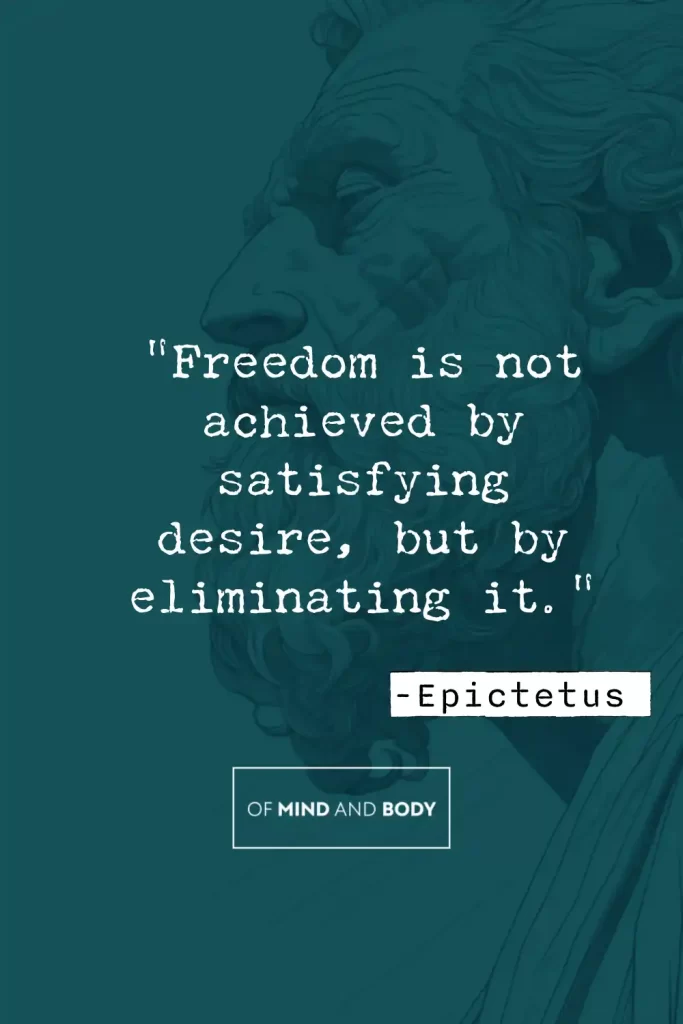
The Wisdom Behind the Words
In the pursuit of self–love, the wisdom of Epictetus offers a profound and counter-intuitive insight: “Freedom is not achieved by satisfying desire, but by eliminating it.” This statement invites us to reconsider our relationship with our desires and the external objects of our longing.
In a world that often equates happiness with the fulfilment of endless wants, Stoicism presents a radical alternative—true liberation and self–love come from within, not from the accumulation of material possessions or external achievements. This perspective encourages us to cultivate a sense of contentment and appreciation for what we already have, rather than being perpetually ensnared in a cycle of wanting more. It’s a call to find peace in simplicity and to recognise that the essence of our well-being lies in our state of mind, not in the external world.
By advocating for the elimination of desire, Epictetus doesn’t suggest we should lead a life devoid of passion or ambition. Rather, he points us towards the liberation that comes from detaching our sense of worth and happiness from things beyond our control. In doing so, we embrace a form of self–love that is unconditional, not contingent upon external validations or achievements.
The essence of Epictetus’s message lies in the realisation that the only true freedom we have is over our perceptions, judgements, and the values we choose to live by. This freedom is the foundation of self–love, as it empowers us to cultivate inner harmony and peace, regardless of external circumstances.
“Very little is needed to make a happy life; it is all within yourself, in your way of thinking.”
Marcus Aurelius
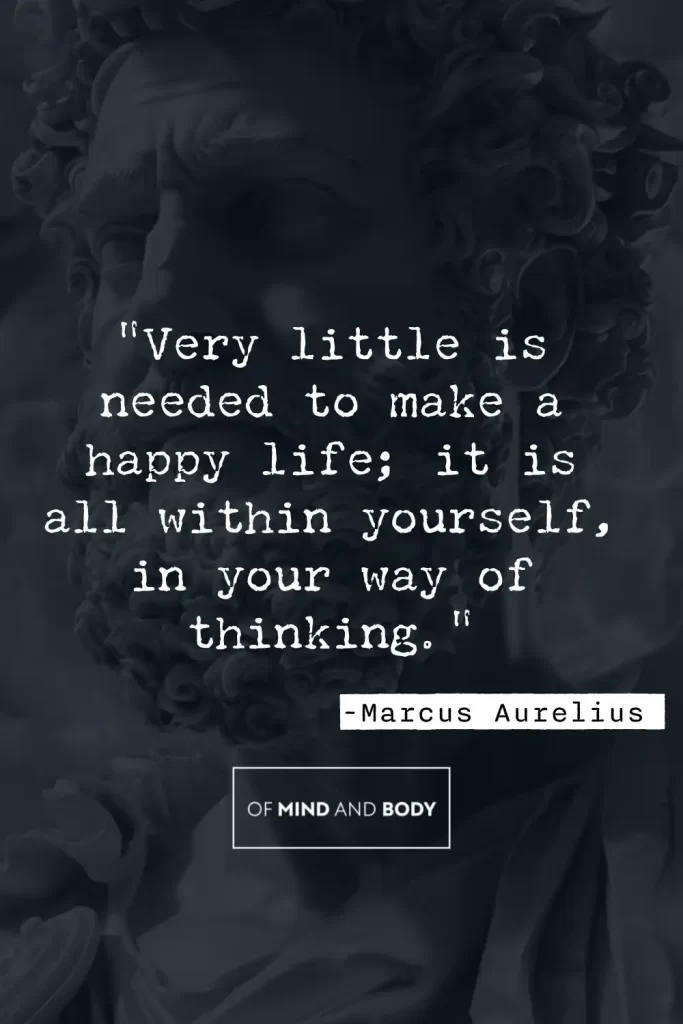
The Wisdom Behind the Words
This timeless piece of wisdom from Marcus Aurelius serves as a powerful reminder of the intrinsic capacity for happiness that resides within each of us. It underscores the Stoic belief that our internal state, rather than external circumstances, holds the key to our contentment.
This perspective invites us to shift our focus from the endless pursuit of external validations and material possessions to the cultivation of an inner sanctuary of peace and self-acceptance. It suggests that happiness is not a distant treasure to be unearthed but a choice, accessible in the here and now, through the practice of gratitude, mindfulness, and positive thinking.
In the context of self–love, Aurelius’ words echo the importance of nurturing a compassionate and forgiving relationship with oneself. The journey towards self–love begins in the mind, with the recognition that we are enough as we are.
By embracing our imperfections and forgiving our mistakes, we open the door to a more authentic and loving relationship with ourselves. This self-compassion becomes the foundation upon which we build a life of contentment, free from the harsh judgements and unrealistic expectations that often lead us astray. It teaches us that by changing our thoughts, we can change our world, transforming our inner landscape into one of serenity and self-acceptance.
“The soul becomes dyed with the colour of its thoughts.”
Marcus Aurelius
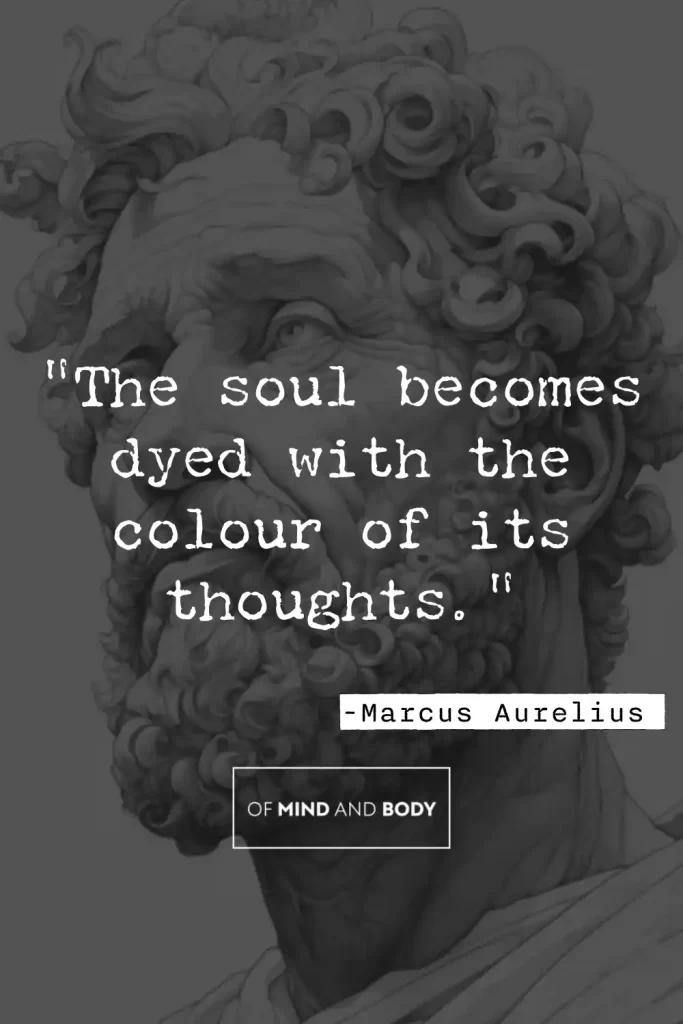
The Wisdom Behind the Words
“The soul becomes dyed with the colour of its thoughts,” Marcus Aurelius muses, offering a profound insight into the human condition that resonates deeply with the journey of self–love. This Stoic wisdom encapsulates the transformative power of our thoughts and their ability to shape our innermost being.
Like a garment absorbing the hue of a dye, our soul, too, is permeated by the quality of our thoughts. This analogy not only highlights the permeability and vulnerability of our inner self to the influences of our mental and emotional engagements but also underscores the responsibility we bear in curating these internal dialogues.
It’s a vivid reminder that the path to self–love begins in the quiet recesses of our mind, where the seeds of self-acceptance, compassion, and resilience are sown and nurtured.
This Stoic principle also illuminates the path to resilience and personal transformation. The realisation that our thoughts have the power to colour our soul invites us to embrace the agency we have over our mental and emotional states.
It encourages us to view challenges and setbacks not as insurmountable obstacles but as opportunities to infuse our soul with richer, more vibrant colours. Each thought, whether born from adversity or triumph, is a stroke of the brush on the canvas of our being, contributing to the masterpiece that is our life. In this way, practising self-love becomes an art form, a deliberate act of creation that beautifies the soul with every thoughtful intention.
“Look within. Within is the fountain of good, and it will ever bubble up, if thou wilt ever dig.”
Marcus Aurelius
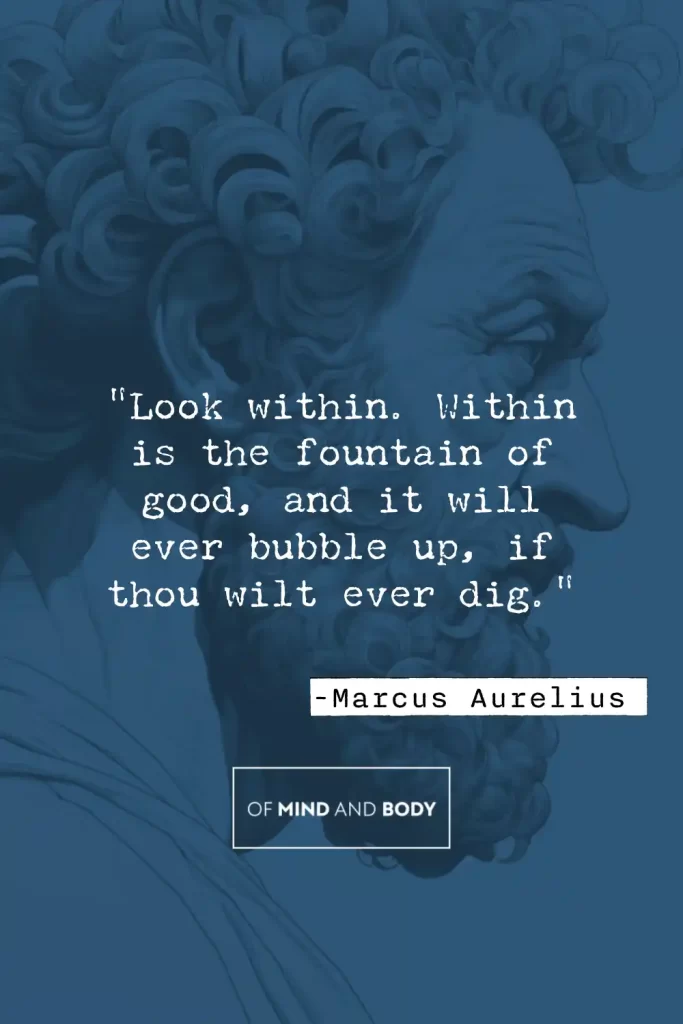
The Wisdom Behind the Words
In the heart of Stoic philosophy lies the belief that true contentment and virtue are self-sourced, a wisdom eloquently captured by Marcus Aurelius in his meditative directive, “Look within. Within is the fountain of good, and it will ever bubble up, if thou wilt ever dig.”
This profound statement serves as a timeless reminder of the inexhaustible well of goodness, resilience, and potential that resides within us all. It suggests that the journey to self–love and fulfilment is not one of seeking external validation or material success, but rather, it is a voyage inward, towards the discovery and cultivation of our own inherent virtues.
Marcus Aurelius’s counsel encourages us to foster a relationship with ourselves that is rooted in kindness, patience, and an unwavering belief in our own goodness. It is a call to action, urging us to actively nurture our inner garden, to tend to it with the same dedication and care we would afford to something precious and beloved. In doing so, we not only discover the boundless good within us but also learn to draw upon it as a source of strength and guidance.
This self-sourced wellspring of goodness becomes the foundation upon which we build a life of purpose, fulfilment, and self-love. Through the Stoic practice of turning inward, we are reminded that we possess everything we need to live a life of deep contentment and meaning, if only we are willing to dig.
“He who lives in harmony with himself lives in harmony with the universe.”
Marcus Aurelius
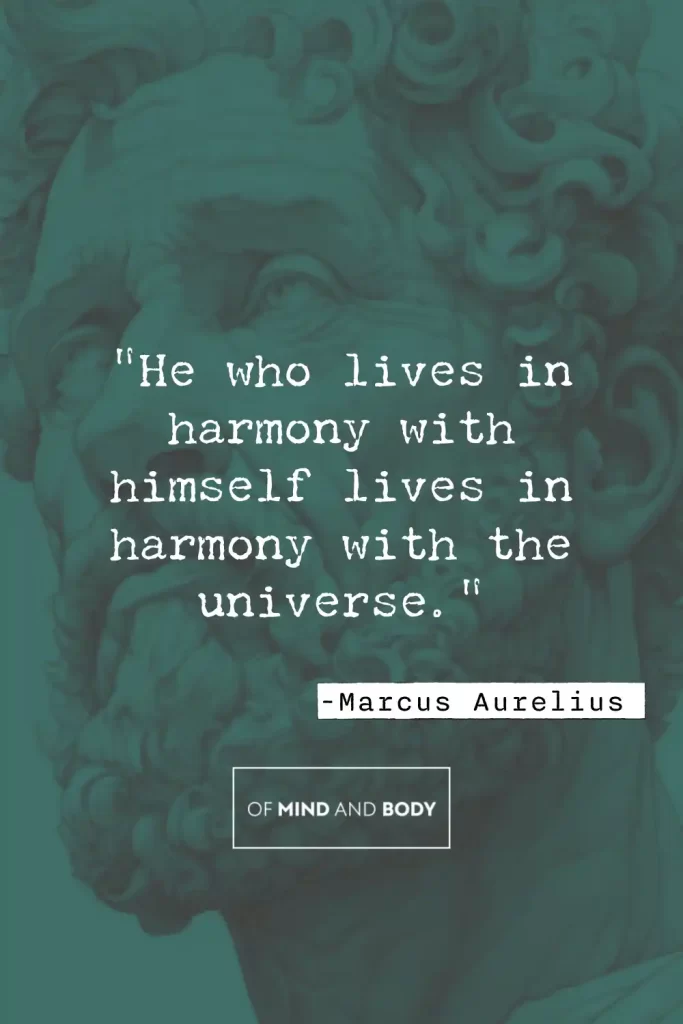
The Wisdom Behind the Words
In the serene wisdom of Marcus Aurelius, the call to live in harmony with oneself is not merely an invitation to self-acceptance but a profound directive towards achieving universal harmony. This Stoic quotes words illuminates the path to self–love, emphasising that inner peace is the cornerstone of our relationship with the world.
The essence of this quote lies in the understanding that the universe operates through a web of interconnectedness, where each individual’s internal state reflects and contributes to the larger cosmic order. To live in harmony with oneself, then, is to align one’s thoughts, actions, and desires with the fundamental virtues of wisdom, justice, courage, and moderation. It is a journey of recognising one’s role in the grand tapestry of existence and embracing the responsibility that comes with it.
The pursuit of self-harmony is both a personal endeavour and a universal contribution. It demands a rigorous examination of one’s beliefs, the courage to confront and dispel inner discord, and the commitment to cultivate a state of inner tranquillity. This process of self-refinement and love is not selfish but an act of profound generosity. By fostering a peaceful and ordered inner world, one naturally exudes serenity and kindness, influencing the outer world in subtle yet significant ways.
This Stoic wisdom offers a beacon of encouragement for those navigating the tumultuous waters of self-discovery and improvement. It reassures us that the quest for self-love is not a solitary or selfish journey but a harmonious alignment with the natural order of the universe.
“People look for retreats for themselves, in the country, by the coast, or in the hills. There is nowhere that a person can find a more peaceful and trouble-free retreat than in his own mind. . . . So constantly give yourself this retreat, and renew yourself.”
Marcus Aurelius

The Wisdom Behind the Words
In the hustle and bustle of modern life, the quest for peace and tranquillity often leads us to seek solace in external environments—be it the serene countryside, the soothing coast, or the tranquil hills. Yet, Marcus Aurelius, in his timeless wisdom, redirects our search inward, to the only place where true peace can be found: within our own minds.
This profound insight not only underscores the essence of Stoicism but also illuminates a path to self–love that is often overlooked. By advocating for a retreat into one’s own mind, Aurelius invites us to cultivate a sanctuary within ourselves, a space where calm and serenity are not contingent on external circumstances but are a reflection of our internal state.
Embracing the wisdom of Marcus Aurelius encourages us to forge a relationship with ourselves that is rooted in understanding, acceptance, and peace. It teaches us that the most profound retreat is not found in the external world but within the depths of our own being.
Final Thoughts
In conclusion, the exploration of “Stoic Quotes on Self Love” reveals a timeless wisdom that transcends the ages, offering us a beacon of light on the path to self-acceptance and inner peace. These quotes serve not only as philosophical musings but as practical guides for nurturing a compassionate relationship with ourselves amidst the trials of life.
These quotes from the Stoic masters remind us that self–love is not a destination but a journey—one that requires reflection, resilience, and a profound understanding of our own worth. As we reflect on the insights gleaned from “Stoic Quotes on Self Love,” let us carry forward the Stoic virtues of wisdom, courage, justice, and temperance, weaving them into the fabric of our daily lives. In doing so, we honour the Stoic tradition and empower ourselves to lead lives of greater fulfilment, tranquillity, and self-compassion.






